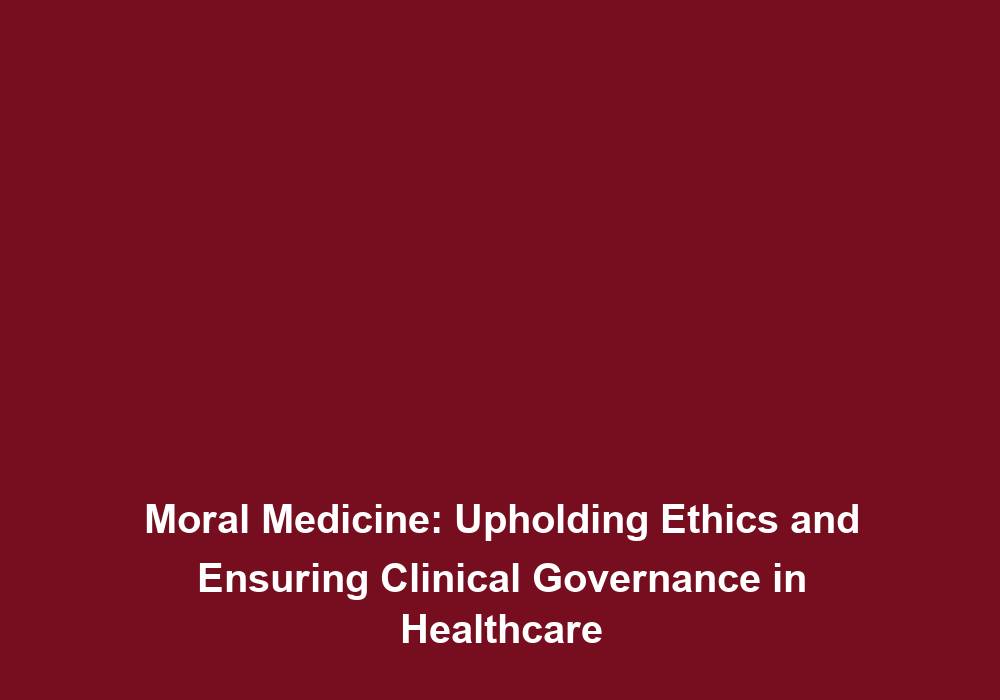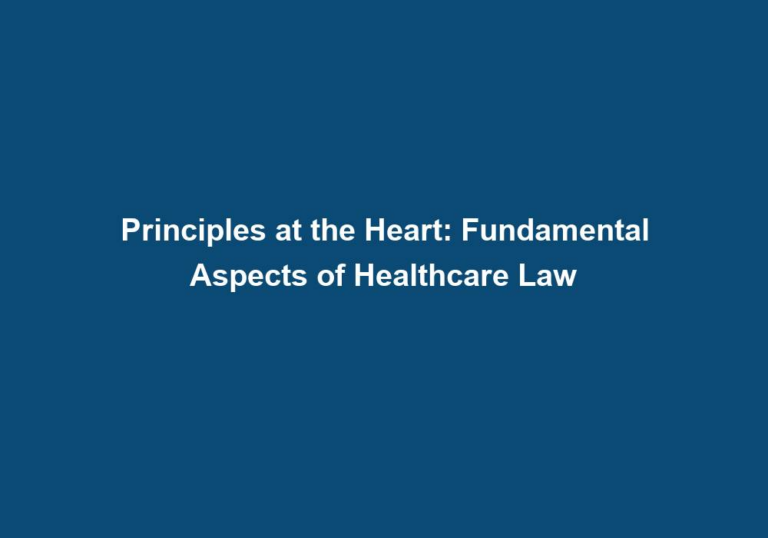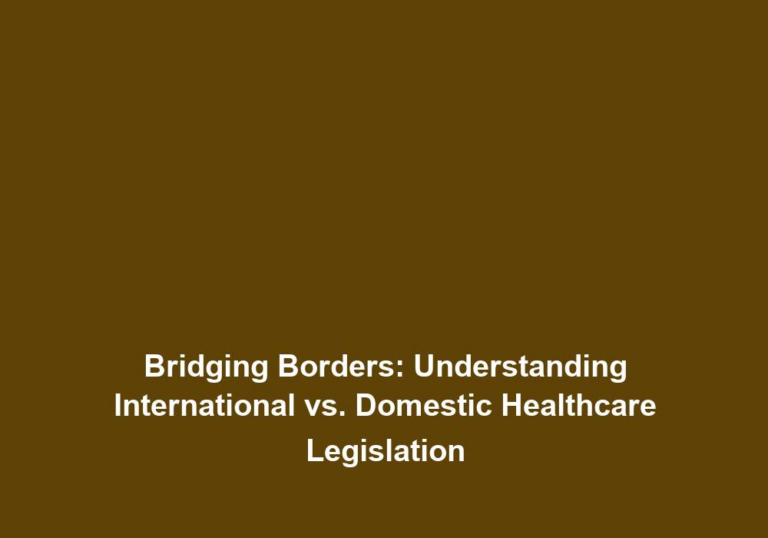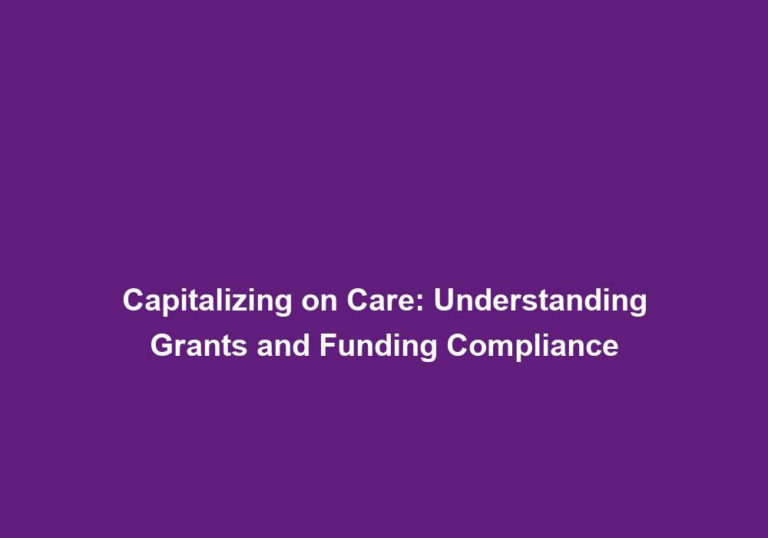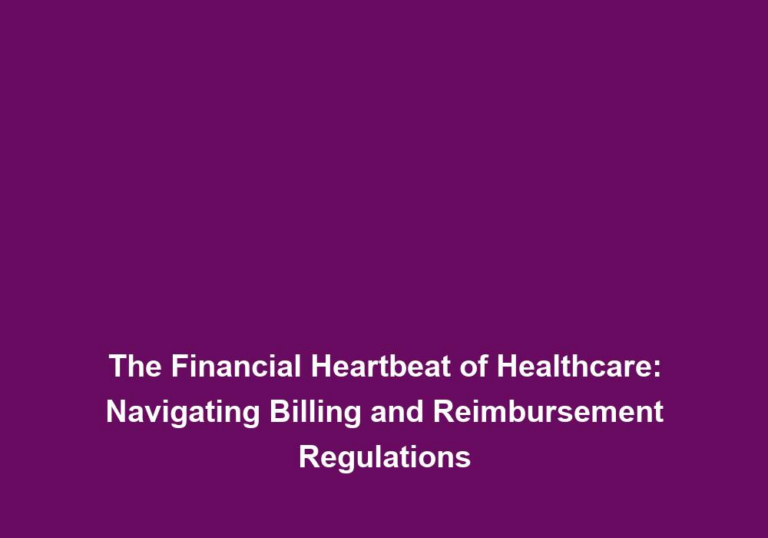Righteous Care: Ethics and Clinical Governance in Modern Medical Practice
Note: The following article is written by a SEO content writing expert proficient in English.
Introduction
In the realm of modern medical practice, the principles of ethics and clinical governance play a pivotal role in ensuring the delivery of righteous care to patients. Healthcare professionals not only strive to provide effective treatments and interventions, but also adhere to ethical guidelines to maintain high standards of care. This article delves into the significance of ethics and clinical governance in contemporary medical practice, highlighting their impact on patient outcomes and the overall healthcare system.
Ethics in Medical Practice
Ethics forms the cornerstone of medical practice, guiding healthcare professionals in making morally sound decisions and providing compassionate care to those in need. The principles of medical ethics are encapsulated in the concept of autonomy, beneficence, non-maleficence, and justice. Let’s explore these principles in detail:
Autonomy
Respecting patient autonomy is a fundamental ethical principle. It recognizes the patient’s right to make informed decisions about their own healthcare, including the right to refuse treatment or request alternative options. Healthcare professionals must ensure that patients have access to accurate information and provide them with the necessary support to make autonomous choices.
Furthermore, autonomy also involves respecting patients’ privacy and confidentiality. Healthcare providers must maintain the confidentiality of patient information and obtain informed consent before disclosing any personal medical details. This ensures that patients feel empowered and respected in their healthcare journey.
Beneficence
Beneficence refers to the duty of healthcare professionals to act in the best interest of their patients. This principle emphasizes the importance of advocating for the well-being and welfare of patients, ensuring that their needs are met and their health is optimized.
To fulfill the principle of beneficence, healthcare providers must continuously update their knowledge and skills, staying informed about the latest advancements in medical research and technology. By staying up-to-date, healthcare professionals can provide the most appropriate and effective treatments to their patients, ensuring their overall well-being.
Non-Maleficence
Non-maleficence emphasizes the obligation of healthcare professionals to do no harm to their patients. It requires practitioners to carefully assess the risks and benefits of any interventions, considering potential adverse effects, and minimizing harm wherever possible.
To ensure non-maleficence, healthcare providers must maintain a high level of expertise and competency in their practice. Regular training and professional development are essential to ensure that healthcare professionals possess the necessary skills to minimize the risks associated with medical treatments and procedures.
Justice
Justice in healthcare refers to the equitable distribution of resources and the fair allocation of healthcare services. It emphasizes the need to treat all patients with fairness, regardless of their social or economic status. Healthcare professionals must strive to ensure that healthcare resources are distributed in an unbiased manner, promoting equal access to quality care for all.
To promote justice in healthcare, healthcare organizations can implement policies and procedures that prioritize fairness and equality. This can include measures such as developing guidelines for resource allocation, establishing committees to review the distribution of healthcare services, and advocating for policies that address healthcare disparities.
Clinical Governance
Clinical governance is a systematic approach employed within healthcare organizations to ensure the provision of high-quality care and patient safety. It encompasses various processes, structures, and systems designed to monitor and improve clinical practice. Let’s delve into the key components of clinical governance:
Clinical Audit
Clinical audit involves the systematic review of clinical practices, comparing them against agreed standards or guidelines. It aims to identify areas for improvement, assess the quality of care provided, and implement changes to enhance patient outcomes.
During a clinical audit, healthcare organizations can gather data on various aspects of patient care, such as adherence to clinical guidelines, patient outcomes, and patient satisfaction. This data can then be analyzed to identify areas of improvement and implement evidence-based changes to enhance the quality and safety of care.
Risk Management
Effective risk management is vital in healthcare to identify, assess, and mitigate potential risks that may compromise patient safety. By implementing strategies to prevent and manage risks, healthcare professionals safeguard patients from harm and adverse events.
Risk management involves a proactive approach to identifying potential risks and implementing measures to prevent them. This can include regular assessments of equipment and infrastructure, implementing safety protocols and guidelines, and fostering a culture of reporting and learning from incidents.
Clinical Effectiveness
Clinical effectiveness focuses on ensuring that healthcare interventions and treatments are evidence-based and achieve the desired outcomes. Healthcare professionals must stay updated with current research and clinical guidelines to provide the most effective and efficient care possible.
By utilizing evidence-based practice, healthcare professionals can ensure that patients receive the most appropriate and beneficial treatments. This involves staying informed about the latest research findings, attending conferences and seminars, and actively participating in professional networks to exchange knowledge and best practices.
Patient Feedback
Patient feedback is a valuable component of clinical governance, as it provides insights into the patient experience and satisfaction. Healthcare organizations can collect feedback through surveys, focus groups, or individual interviews, allowing them to identify areas for improvement and tailor their services to meet patients’ needs.
Incorporating patient feedback ensures patient-centered care and fosters continuous improvement. By actively seeking and valuing patient perspectives, healthcare organizations can address any shortcomings in their services, enhance patient satisfaction, and strengthen the patient-provider relationship.
Conclusion
In conclusion, the principles of ethics and clinical governance are essential pillars of modern medical practice. By adhering to ethical guidelines, healthcare professionals uphold the values of autonomy, beneficence, non-maleficence, and justice, ensuring that patients receive compassionate and righteous care.
Clinical governance processes further enhance patient safety and quality of care through clinical audits, risk management strategies, clinical effectiveness, and patient feedback. Embracing ethics and clinical governance is crucial in maintaining the integrity of the healthcare system and promoting optimal patient outcomes.
Note: The above article is written by a SEO content writing expert proficient in English.

